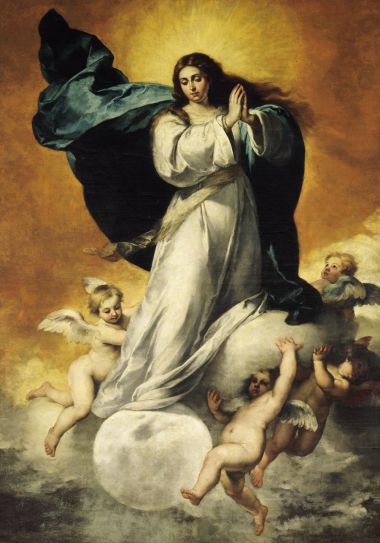Not the Virgin Birth: Why Christians get confused about the 'Immaculate Conception' of Mary
Today is the feast of the Immaculate Conception in the Roman Catholic Church. It's a notable occasion not only as a markerMarian theology, but also because the 'immaculate conception' is still confused on a regular basis with something similar but crucially different – the virgin birth of Christ.
The Immaculate Conception refers to the idea that Mary, the mother of Jesus' was herself conceived free from original sin (which all human beings have been born with since the Fall), when born to her mother, St Anne.

The Roman Catholic Church proclaims 'that doctrine which holds that the most Blessed Virgin Mary, in the first instance of her conception, by a singular grace and privilege granted by Almighty God, in view of the merits of Jesus Christ, the Saviour of the human race, was preserved free from all stain of original sin'.
Though a popular belief for centuries, the dogma was only officially enshrined in the 1854 papal encyclical Ineffabilis Deus by Pope Pius IX. The theology, the Pope acknowledged, was not drawn obviously from any proofs in Scripture, but found credence in the wide acceptance of the idea in both popular piety and among the clergy. He saw the doctrine as implicit in the theology of the early Church Fathers. When it eventually emerged as a more explicit idea it divided theologians: the 'angelic doctor' Aquinas rejected the dogma, while the theologian John Duns Scotus defended it.
Understanding Mary according to Old Testament 'types' like the Ark that preserved Noah, or, most famously, the temple in which God's Spirit dwelt, is key to understanding the Catholic doctrine. Just as the holy temple must be pure, free from stain and 'immaculate' for what it houses, the same applied to Mary in virtue of the child she would bear. As for its lack of explicit reference in Scripture, advocates might say that the doctrine of the Holy Trinity is likewise implicit in Scripture, but never clearly 'proven'. Critics might respond that in preserving Mary this doctrine undermines the humanity-embracing impact of the incarnation, and suggests Mary – if sinless – wouldn't have needed Christ's redemption.
Marian theology can seem especially strange to many Protestants, but contrary to caricature it centres not on the 'worship' of Mary but in revering her special place in salvation history not as a mere vessel but as the theotokos, 'mother of God'.
It's easy to see why this dogma gets confused with the belief in the Virgin Birth, as it consistently is in popular culture. Both ideas involve Mary, and Christ's conception was also 'immaculate' in the sense that it came from the Holy Spirit and he was without sin. 'Virginity' often connotes ideas of 'purity' or being 'immaculate', so again, the concepts can be muddled.
That said, they are crucially distinct. One is about Mary, the other primarily about Christ. One (the immaculate conception) is exclusive to Catholic theology, while all orthodox traditions confess the Virgin Birth according to the Apostles' Creed.











